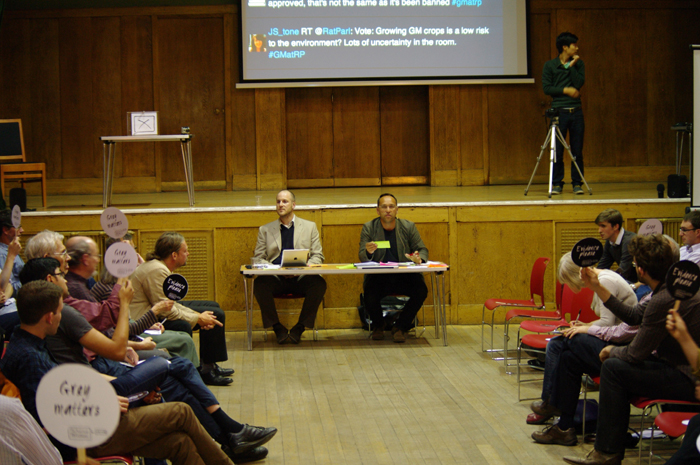
On Tuesday, the first-ever sitting of the Rational Parliament took place at Conway Hall in central London. The proposed motion for this debate was: “This House agrees that genetic modification is a rational approach to meeting food demand.”
The inaugural session was opened by host Adam Smith welcoming the pioneering Members of the Rational Parliament (MRPs) and explaining the rules and regulations. MRPs were encouraged to post their proposed motions, opinions and general feelings on the Policy Board, where they could be voted on by others and so chosen for discussion. MRPs and observers could also follow live Twitter feed on screen during the debate.
The Speaker of the House, science writer Michael Brooks, began by reminding the MRPs to be nice to each other – something that tweeters wished the UK Parliament would adhere to as well. First the MRPs heard from two scientists who have conducted research in the field of GM food. After a coin toss, Prof John Lucas from the Rothamsted agricultural research institution was invited to be the first speaker. In his opinion, GM food is an extension of hundreds of years of changing the crops and animals that we farm. He also argued that the issues linked to GM foods, such as ownership and safety, are not limited to them, but exist for other less controversial products as well. He concluded by emphasising the importance of GM foods to fighting world hunger.
Second to speak was Professor Andrew Stirling from the Science and Policy Research Unit, University of Sussex. He highlighted the importance of scepticism and choice when discussing GM food as an answer to global food demand. While he was not directly opposed to GM food, Stirling argued that because of business interests GM food is too often seen as the only option for alleviating food shortages at the cost of other – just as viable – alternatives.
MRPs from both sides of the argument then debated topics such as trial GM crops, and activists who destroy them; whether there actually is enough food in the world already; trustworthiness of companies controlling GM food production; and the effects of the price of GM research. Votes took place on several questions, including “does GM food production pose a low risk to people’s health” (majority say yes) and “is growing GM crops a low risk to the environment” (MRPs vote a tentative no) and “can we trust large corporations with patents on basic foodstuffs?” (overwhelming no). “Evidence Please” placards started appearing when an MRP said there is no gene that can increase crop yields.
Every now and then the MRPs heard from the Rhetoric Officer Johnny Unger, a linguist from Lancaster University, who drew attention to the rhetorical devices used by speakers. For example, he brought up some potentially manipulative tactics used by Profs Lucas and Stirling, such as strawman arguments (“anti-GM people want everything to be 100% safe” and “GM proponents claim the solution is GM or nothing.”)
After much debate over the wording of the final motion, voting took place on the revised statement: “This House agrees that GM food has a contribution to make in meeting global food demand.” After counting, the motion passed with 35 for and 10 against with 1 abstention in the box (and many more undeclared abstentions - not nearly everyone who was present in the debate voted).
The final motion might have been a bit vague to most MRPs’ liking, but this goes to show the complexity of the issue. The debate brought up several important and interesting points, with MRPs generally adhering to the house rules and listening to others even when the discussion heated up. Widening one’s perspective and understanding of the debate topic might be the greatest result of the first Rational Parliament session. Indeed, a question asked in the ballot cards: “During the debate, did you think more widely than usual?,” was answered overwhelmingly in the positive.
Adam Smith commented on the inaugural session: "What an exhilarating and eccentric experience the first sitting of the Rational Parliament turned out to be! Our aim was to test our format - both the general principle that we can have a public debate about a political issue with relevant researchers in the room, and the specific gimmicks we designed to keep the debate going,” he said, adding: “We showed that the principle works: loads of debaters came up to me afterwards to say they had loved having a debate with such a mix of people, including scientists. And we saw that while some of the gimmicks worked - especially the ability for people to propose motions and explain their feelings on the night – there is lots of room for improvement.”
Eager MRPs should keep an eye out for another debate: “I'm really excited by the prospect of refining our format and holding a second sitting soon," Smith says.
You can follow Rational Parliament on Twitter @RatParl and Facebook

